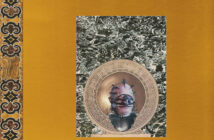
The last time I heard Erstlaub was on Broadcasting on Ghost Frequencies, a barrage of static whose prickly monotony suggested shapes, colours and events that may or may not really have been present. This is the first time I see Erstlaub – Marconi’s Shipwreck is a seventy-two-minute video. That prickly barrage of static turns out to have a bluish demeanor, familiar as the interference on television when it was broadcast via the analogue system. It appears in sheets and waves and cross-hatches. Thick, vertical bars suggest architecture being viewed through the window of a passing train. Seventy-two minutes of this does not make for must-see television, but it is nice to have on in the corner, giving off its warm, blue glow.
Radio pioneer Marconi suggested that soundwaves never die, they just slowly fade as they drift further away from us. Dave Fyans, who reminds of us this hypothesis, is Erstlaub and he proposes his piece as a commentary on man in the communication age: “Technology has the ability to connect people; conversely it can lead to intense feelings of isolation, lack of human contact and disconnection. And so we find ourselves scuttled, clinging to the wreckage we drift, trying to make sense of the new horizons we inhabit.â€
Marconi´s Shipwreck is indeed transportive, both as audio and video, but earthbound rather than seafaring, a Trans-Siberian Express speeding headlong over steppe and snow-swept tundra. Erstlaub moves us unrelentingly forward but with a meticulous ear for eddying detail, the slowly-varying loop, ruddy complexion. At a certain point, progress is heeded and gets knotted up in a great ball, out of which emerges Erstlaub´s equivalent of an infinite, if distant, guitar solo. A chipper, xylophone-like melody mimics the clickety-clack rhythm of the undercarriage before being swept up in a grand dub crescendo swallowed by a snow squall. The long, hydraulic denouement glides to a slow halt at the end of the line.
Fyans calls his work “time based art” and like the accompanying video, the key to its enjoyment lies in the subtle dramatics worked upon it over the duration.
Stephen Fruitman



